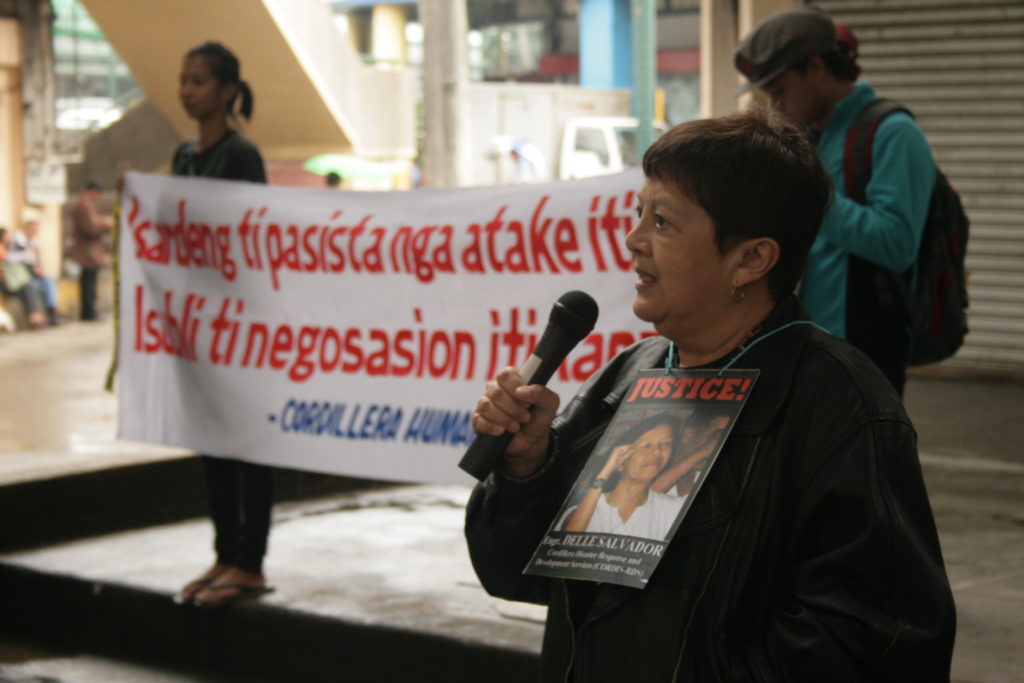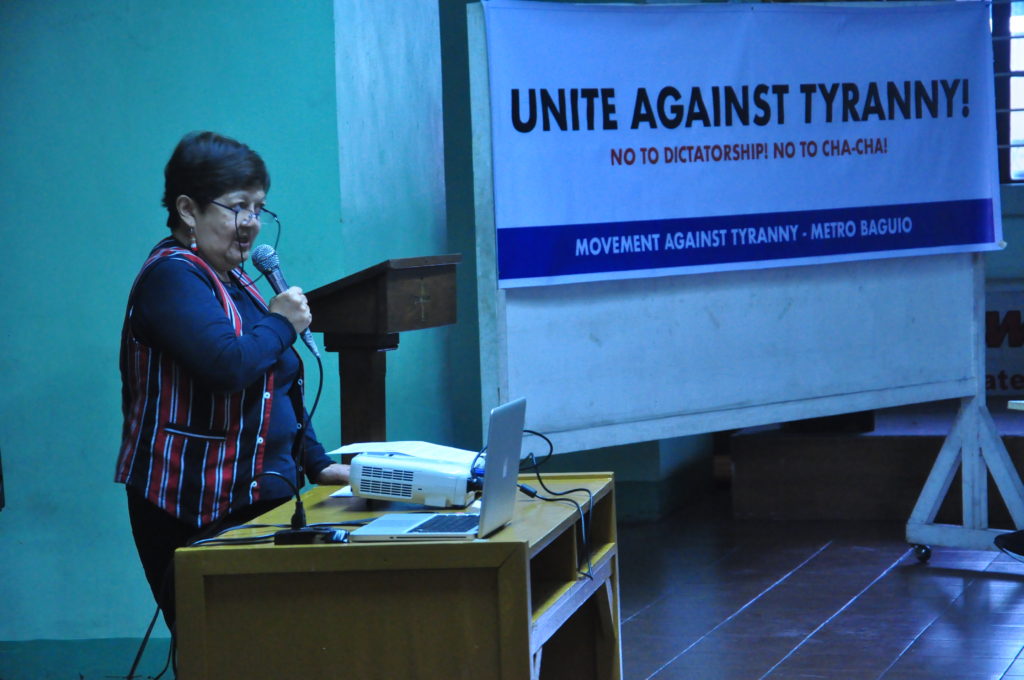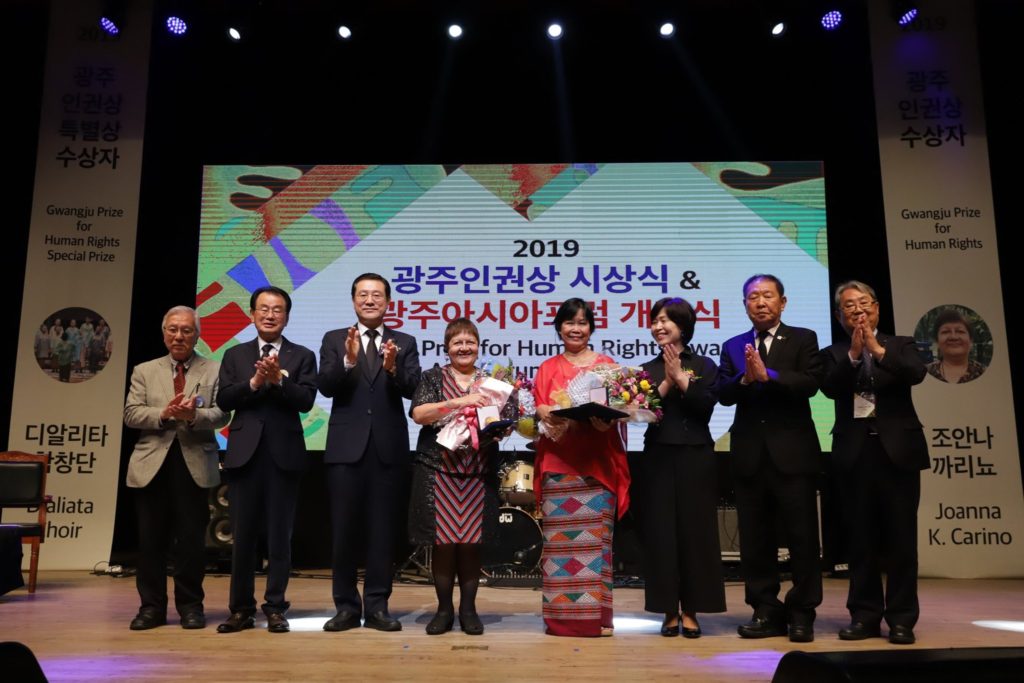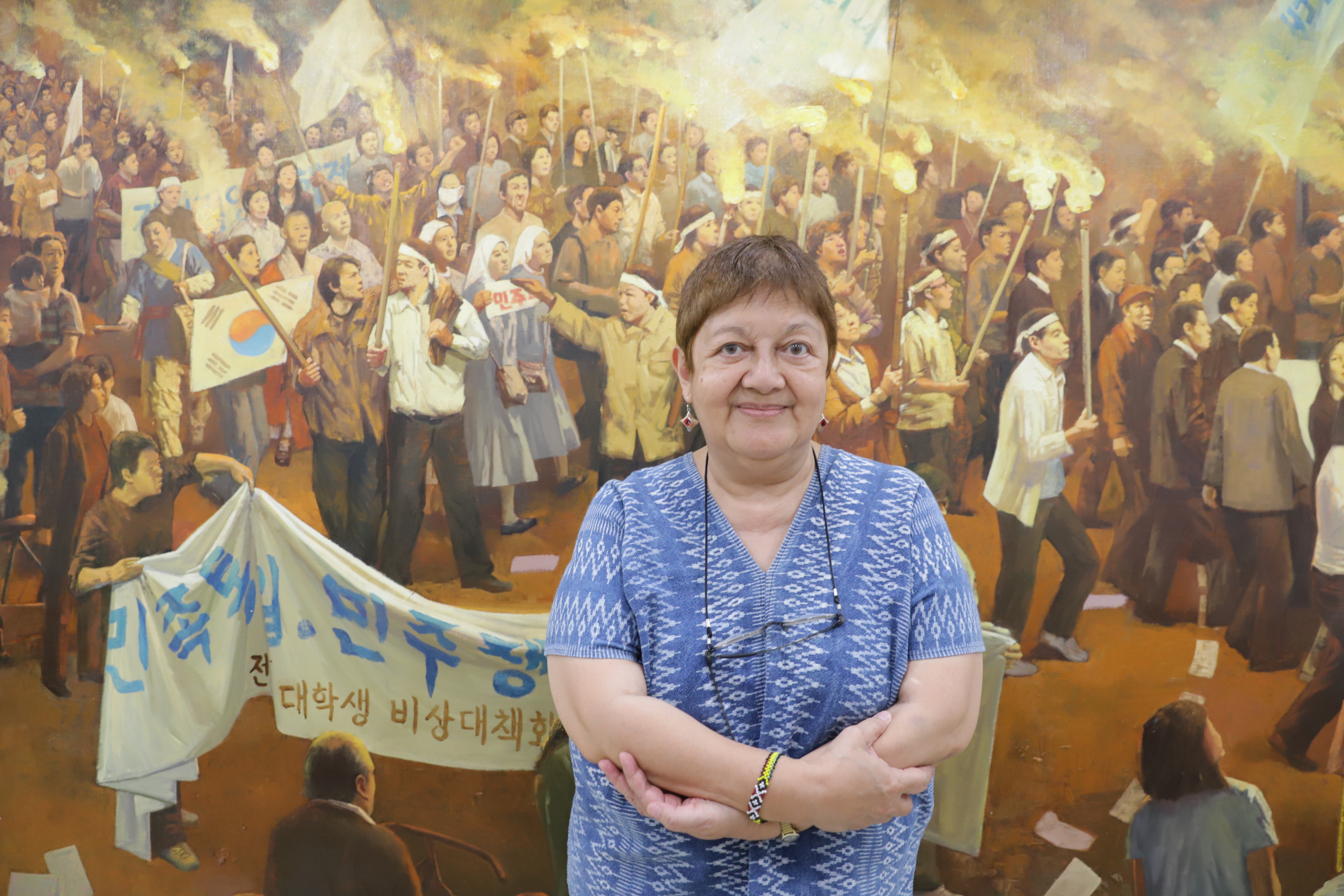Joanna Cariño: Soldiering On in the Struggle for Indigenous People’s Rights
Written by Gianna Francesca Catolico
With more than 170 ethnic groups from its concrete jungles to its remote settlements, the Philippines cements itself as a cocoon of ethnic and cultural diversity in Asia. In the mountainous northern Philippine region of Cordillera alone, an enormous number of ethnic and religious minorities have thrived, one of which is the Ibaloi from Benguet Province. Hailing from this ethnic group is this year’s winner of the Gwangju Prize for Human Rights (GPHR), Joanna K. Cariño, who has been at the forefront in the struggle against human rights violations in the region from the Martial Law era up to the incumbent presidency of Rodrigo Duterte, Joanna has been the ebullient voice of the Cordillera grassroots movement, often sporting her traditional Ibaloi divit (skirt) and kambal (blouse) during protests or activities.

The first few lines of her acceptance speech at the 2019 Gwangju Prize for Human Rights awarding ceremony were a testament to her fearlessness and dedication in the field of indigenous people’s rights. Last year, the Philippines’ Department of Justice tagged her and six other Cordilleran activists as alleged “terrorists” and so-called sympathizers of the Communist Party of the Philippines and the New People’s Army, a move that rather emboldened Joanna to denounce the Duterte regime for its overt disregard for civil liberties and rule of law.
“I am deeply honored to have been chosen as the awardee for the 2019 Gwangju Prize for Human Rights,” she shares upon receiving the prize. “It is ironic that while the repressive Philippine Duterte regime labels human rights activists such as myself as terrorists, prestigious foreign institutions such as the May 18 Memorial Foundation recognize my human rights activism as honorable.”

Activism Flows in Her Blood and Veins
Activism and passion for human rights runs in the blood and veins of Joanna. An Ibaloi native from Baguio City, Joanna is part of the influential Cariño clan, the traditional landowners of the mountaintop city dubbed the “Summer Capital of the Philippines” for its year-round cool weather. During the American colonial rule, the ancestral lands of the natives of Baguio were forcibly seized, including the land owned by Joanna’s great-grandfather.
With the support of her parents, Joanna, along with her four siblings, became student activists during the Martial Law era. Her elder sister, Jennifer “Jingjing” Cariño, sacrificed her life during the anti-Martial Law movement in 1976.

“Martial law breeds resistance and revolution,” Joanna explained. “An oppressive and exploitative system breeds revolutionary families. There are eight of us siblings in the family and even before Martial Law, five of us were already student activists. The three younger ones also became activists when they grew older during the Martial Law era. My older sister, Jingjing, is a martyr to the revolutionary cause. Together with my younger sister, Joji, I was illegally arrested, tortured, and detained without charges for two years.”
Joanna was a lecturer at the University of the Philippines – Baguio from 1980 to 1983. When mass movements against construction of dams and logging concessions blossomed, as well as protests to overthrow the dictatorship of then-President Ferdinand Marcos, she gave up her career in academia and became a full-time activist from 1984 up to the present. “It is in the nature of youthful idealism to question, to seek answers and solutions, to work for a better society, especially if the one we have is beset with problems,” she elucidated.

For Joanna and other Filipino human rights activists, the Gwangju Uprising has resembling elements with the 1986 EDSA People Power Revolution. In both uprisings, a multitude of civil society groups, members of the clergy, and students merged forces to resist authoritarianism. “I truly identify with the spirit of the Gwangju Democratic Uprising of 1980 and take note of the parallelisms between South Korea and the Philippines as we struggled against dictatorships,” Joanna added. “We should always remember and never forget the lessons of history. Otherwise, historical revisionism will surface and try to rewrite history from the rulers’ point of view.”
Joanna was one of the founders of the Cordillera People’s Alliance for the Defense of Ancestral Domain and Self-Determination (CPA), the Cordillera Resource Center for Indigenous People’s Rights, the Sandugo – Movement of Moro and Indigenous Peoples for Self Determination, and SELDA–Northern Luzon, an association of political detainees during the Marcos regime. Some of CPA’s activities include education and organizing around indigenous people’s rights, ancestral lands and resources, and the annual commemoration of Cordillera Day on April 24 to honor indigenous heroes and martyrs, among others. Her community’s steadfast movement triumphed over the construction of the Chico Dams Project and the Cellophil Logging Concession, which would have displaced thousands of indigenous peoples in the region. Despite this, the struggle against predatory corporate interests is far from over, as they are now gallantly protesting against Chinese intervention in the construction of the Kaliwa Dam Project and the Chico River Pump Irrigation Project.

Meanwhile, SELDA has been assisting Martial Law victims in claiming reparations from the government. Apart from her work in NGOs, Joanna is a prolific writer and researcher, having published numerous journals and books on indigenous people’s rights.
The State of Indigenous People’s Rights Today
The struggles of the Ibaloi and other ethnic groups in reclaiming their ancestral lands persists up to today, and alas, the human rights situation in the Cordillera has deteriorated due to a hasty plague of extrajudicial killings, torture, and enforced disappearance under the Duterte regime. Several ethnic groups, chiefly the Lumad people of the Southern Philippines, are heavily militarized, harassed, and displaced from their ancestral lands, a phenomenon that Joanna and other Filipino human rights defenders believe is the peak of relentless cruelty against indigenous communities. “The state of indigenous peoples’ rights has worsened under the Duterte regime, as he tries to impose development aggression on indigenous communities, and employs the military to quell resistance,” she added.

Moving Mountains for Human Rights and Democracy
Although her focus is on indigenous people’s rights in the Cordillera region, Joanna extends her activism and solidarity across all communities even to the far-flung islands. Amid her age at 68, she is always visible during public engagements and in the streets during rallies, even as far away as Manila. “We will continue to stand up, to educate and organize, to campaign and advocate for indigenous peoples’ rights among the indigenous peoples of the Cordillera and the Philippines. We will unite with the other oppressed and downtrodden sectors of society to help build the broadest united front against tyranny and martial law in the Philippines. This is the lesson from the People Power Uprising of 1986,” Joanna concludes.
Joanna plans to allocate the prize money from the GPHR award towards building a CPA training center. Through the establishment of this training center, Joanna envisions enhancing building capacity and “passing the torch” to an enthusiastic roster of young human rights defenders in the Cordillera region.

Before concluding the interview, Joanna left galvanizing words of wisdom to her fellow human rights advocates:
“Human rights make us human. With every violation of human rights, our humanity is diminished. The human spirit can take only so much oppression before resistance develops. Repression breeds resistance. To stand up for human rights, to resist tyranny, and to rebel against an oppressive system is justified. However, we have to prepare ourselves for sacrifice and even death in the struggle against tyrants for people’s democracy and a better world. It is honorable to stand up for democracy and to defend human rights, especially for the less fortunate and downtrodden.”
Indeed, her GPHR award serves as a ray of light at a time when the silhouettes of state violence and tyranny torment human rights stalwarts in the Philippines and the rest of Asia.
Photographs courtesy of by Joanna Cariño and Kyounghun Choi/May 18 Memorial Foundation
The Author
Gianna Francesca Catolico is an intern from the Philippines at the May 18 Memorial Foundation. She recently finished her master’s degree in human rights and democratization from Mahidol University in Thailand. She has been sojourning around Asia over the past three years.
Note: A portion of this article appeared in the May 2019 issue of 주먹밥, a biannual magazine published by the May 18 Memorial Foundation.







